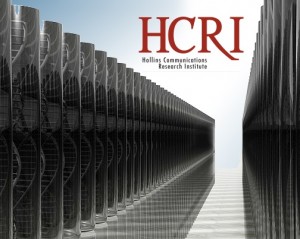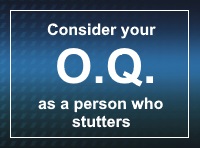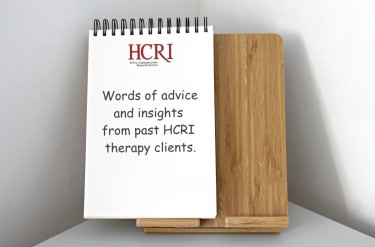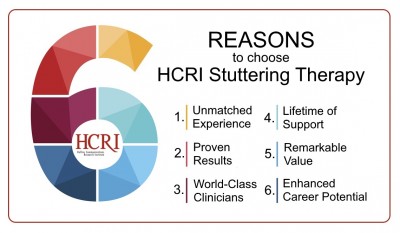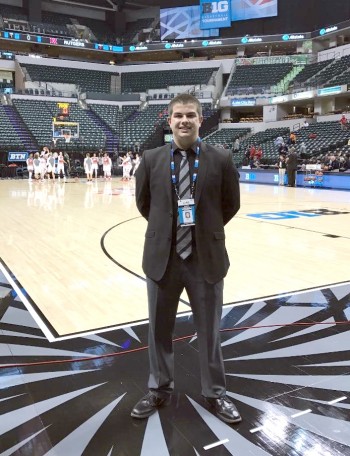At Hollins Communications Research Institute (HCRI), we help individuals who stutter achieve and maintain fluent speech for a lifetime. Our involvement with clients extends long after their participation in our 12-day stuttering therapy program. In fact, we serve as a partner in fluency for life.
On the last day of therapy, clients receive an extensive package of fluency-practice tools and support that help habituate speech techniques learned during HCRI’s treatment program. HCRI “alumni” are encouraged to practice their newly acquired fluency skills once they return home. We also encourage them to check in regularly after therapy and reach out whenever they need guidance from our clinicians.
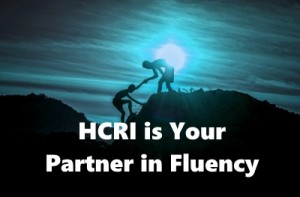 For many participants, HCRI stuttering therapy is a one-time experience where fluent speech has replaced stuttering – and additional treatment is not necessary. Research demonstrates that 93 percent of clients achieve fluency by the end of their 12-day therapy program. In addition, 75 percent maintain fluent speech when evaluated two years after treatment.
For many participants, HCRI stuttering therapy is a one-time experience where fluent speech has replaced stuttering – and additional treatment is not necessary. Research demonstrates that 93 percent of clients achieve fluency by the end of their 12-day therapy program. In addition, 75 percent maintain fluent speech when evaluated two years after treatment.
Some alumni may request additional assistance if they find their fluency has gotten off track after a period of time. This is why the institute hosts alumni refresher programs that are held on-site at HCRI and remotely via the web. Along with ongoing contact with HCRI clinicians, these refreshers have proven to be beneficial for clients.
For example, an alumna who attended HCRI stuttering therapy nearly 25 years ago sent the following note after she was tasked with giving a challenging presentation at work. Before her presentation, she engaged in a remote Alumni Refresher program with one of HCRI’s clinicians. The therapy was conducted using FaceTime and a computer. It included eight one-hour sessions, which were scheduled twice per week.
“I’m so proud to share a recent experience with you. As you know, I serve as a faculty member and researcher in higher education and regularly teach online and present at conferences. But the circumstances at the conference last week were more challenging than usual.
I presented to an audience of approximately 100 attendees in person. The session was also being professionally filmed for later viewing, and live streamed to virtual attendees. Knowing that I was being filmed, plus the bright camera lights in my eyes, created additional pressure. But I did it! I fought the urge to rely on spontaneous fluency. I focused on full breath and amplitude contour [that I learned at HCRI] and felt confident in my ability to produce fluent speech.
Again, I speak at conferences all the time, but not typically under these conditions. This scenario would’ve made any speaker nervous. Afterward, I had a moment of reflection and appreciation that I am a stutterer and I just did something pretty amazing.
…Thank you for your help and continued support. I’ll check in again next week.”
In addition to remote refresher programs for alumni, HCRI provides on-site, five-day Alumni Refreshers, two-day Target Tune-Ups, Alumni Retreats, hourly remote therapy sessions, and a variety of other offerings. For more details on these and other alumni-support services, click on the link below.
Learn more about HCRI’s post-therapy resources >>
About HCRI
HCRI was founded by Ronald L Webster, Ph.D. in 1972 to investigate stuttering through scientific discovery and treatment innovation. Virginia-based HCRI, a 501 (c) (3) charitable organization, has become an international leader in stuttering research and the development of scientifically derived therapy approaches.
More than 6,500 people from across the U.S. and 50 countries have come to HCRI to achieve fluency. Clients come from all walks of life and include teachers, business professionals, athletes, broadcasters, engineers, musicians, students, doctors, military personnel, police officers, actors, a Supreme Court nominee, and even royalty.
HCRI is located at 7851 Enon Drive, Roanoke, Va. 24019. For more information, visit www.stuttering.org or contact HCRI at (540) 265-5650.


.jpg)
